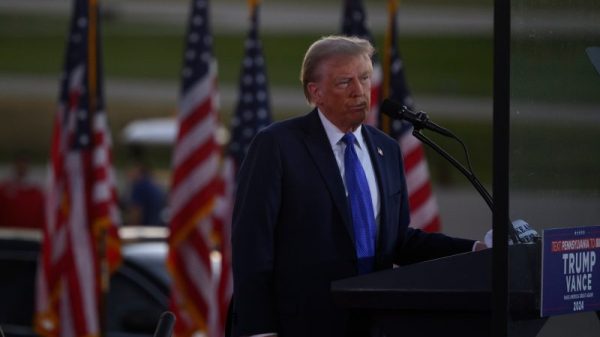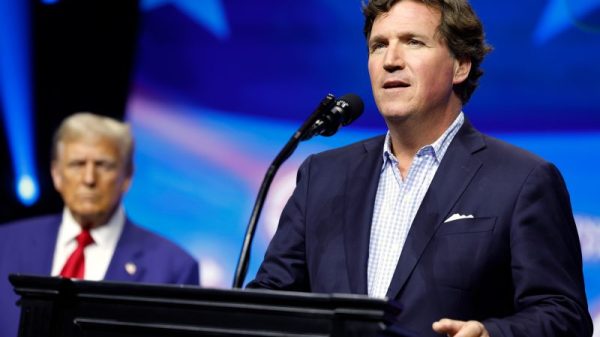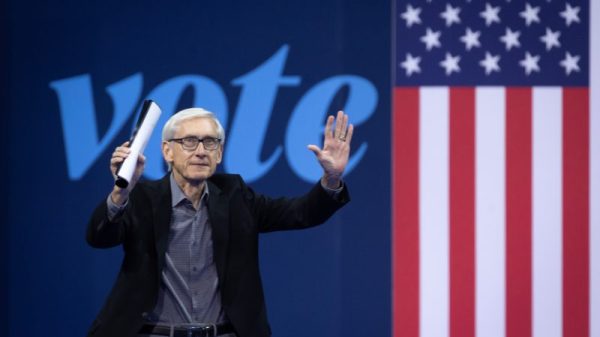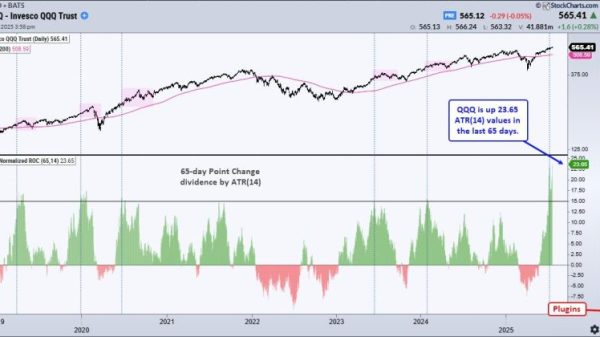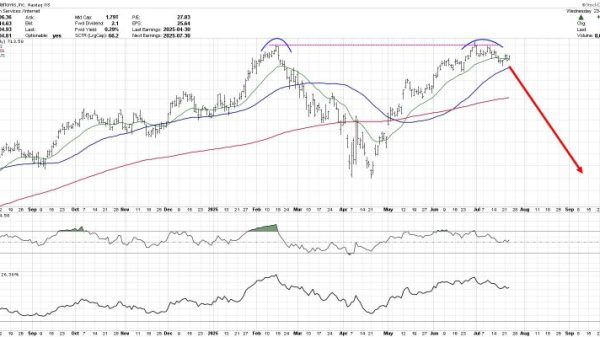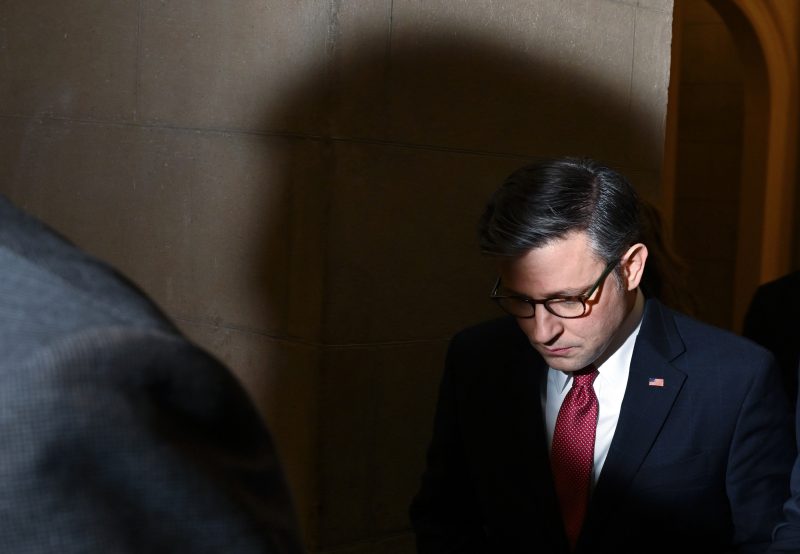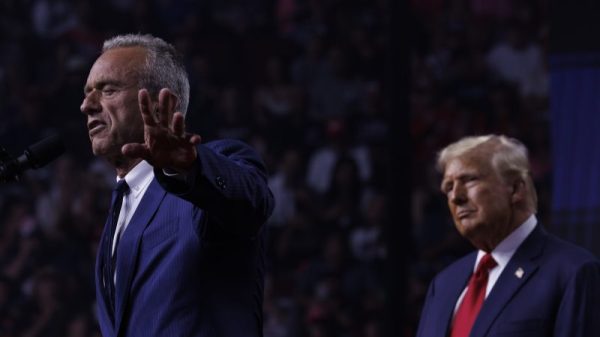House Speaker Mike Johnson (R-La.) has held his position for barely four months, not long by anyone’s standards, but long enough to ask this question: Does he have any major priority other than survival?
Johnson has spoken repeatedly and sometimes vehemently about pending issues. He has called for tougher policies to halt the surge of migrants coming across the U.S.-Mexico border. He has said he favors additional aid for Ukraine in its war against Russian aggression and more assistance for Israel in its war with Hamas. But he has delivered on none of this, even when given the opportunity for action.
Johnson’s actions fall far short of words. In fact, they have been in conflict. Johnson keeps finding loopholes or excuses or rationales to avoid acting on the very priorities he claims to support. He is another exhibit in what has become the story of House Republicans, which is a failure to meet or even recognize the demands of governing, one of them being a willingness to compromise.
On Friday, the world was shaken by the news that Russian opposition leader Alexei Navalny had died in a Russian prison. Johnson said in a statement that Russian President Vladimir Putin must be met “with united opposition,” adding, “As Congress debates the best path forward to support Ukraine, the United States, and our partners, must be using every means available to cut off Putin’s ability to fund his unprovoked war in Ukraine and aggression against the Baltic states.”
One means for supporting Ukraine is legislation approved on a strong bipartisan vote in the Senate that would provide $95 billion in assistance for Ukraine and Israel, humanitarian assistance for Gaza and other funds. But Johnson immediately denounced the bill.
“House Republicans were crystal clear from the very beginning of discussions that any so-called national security supplemental legislation must recognize that national security begins at our own border,” he said in a statement. Calling the Senate bill a “status quo” measure, he added, “The mandate of national security supplemental legislation was to secure America’s own border before sending additional foreign aid around the world.”
It was an exercise in circular logic by the speaker. Previously he had declared as “dead on arrival” in the House a bipartisan Senate proposal that included provisions to secure the border as well as aid for Ukraine and Israel. That bill was the result of months of difficult negotiations among Republican and Democratic senators. Those talks had begun only because Republicans had insisted that Democrats and President Biden act on border security, saying they would not accept a Ukraine-Israel funding bill without something on immigration.
The proposal amounted to the most conservative bipartisan immigration legislation proposed in decades. But once former president Donald Trump denounced it, it had no future in either the Senate or House. Republican senators ran away from the measure, and it was defeated there.
Johnson knows that to put the newly passed $95 billion aid package on the floor for a vote would put his speakership at risk. Not to do so threatens the future of Ukraine’s efforts to hold off the Russians. Biden put the House on notice on Friday during an appearance whose main purpose was to hail the courage of Navalny and to blame Putin for his death.
“History is watching the House of Representatives,” he said. “The failure to support Ukraine at this critical moment will never be forgotten. … The clock is ticking, and this has to happen. We have to help now.” He expressed exasperation that the House is in a two-week recess at a time when it could be acting to help Ukraine.
Johnson is an accidental leader. He is the product of a dysfunctional Republican majority that ousted Rep. Kevin McCarthy (R-Calif.) from the speakership after less than a year in office and then pummeled other prospective candidates for the top job until, exhausted and embarrassed, House Republicans settled on the little-known Johnson.
He was put in the position of trying to lead with the narrowest of majorities and in the face of a faction of hard-right rebels who can neither be persuaded nor appeased. It is a difficult job, made the more so by Johnson’s lack of experience in high-stakes governing. That is an explanation but hardly an excuse for what he has done to date.
Johnson is a leader in name only, buffeted on all sides to the point of immobility. His lone success, if it can be called that, was House passage of a resolution to impeach Homeland Security Secretary Alejandro Mayorkas. The margin was by a single vote, and it came a week after Johnson and company were embarrassed by the failure to pass a similar resolution because Republican vote counters were outfoxed by House Democrats.
House Republicans found no high crimes or misdemeanors, the standard for such a rare step. Instead Mayorkas fell victim to policy disputes between Republicans and Democrats and to the administration’s failure to move more quickly and decisively to deal with the problems at the border. There is virtually no chance a trial in the Senate will result in the secretary’s conviction. Senators probably will make quick work of their responsibilities.
The decision by House Republicans to go ahead with the impeachment of Mayorkas amounted to performative politics in the extreme. As others have said, if lawmakers want to solve a problem, they have to introduce legislation and then get enough votes to pass it — and in the Senate that still means 60 votes, not a simple majority.
Johnson has chastised Democrats on immigration, pointing to legislation Republicans approved last year on a party-line vote and asking why the Senate has not taken it up. In a divided government, neither party fully gets its way. But House Republicans, hamstrung by their tiny majority, refuse to compromise. They look inward rather than outward.
A decade ago, Lamar Alexander, the former senator from Tennessee, once said that the division inside the Republican Party was not one of moderates vs. conservatives but rather “between conservatives who think their job is finished when they make a speech and conservatives who want to govern.” By that measure, things have only gotten worse in the past decade.
The GOP’s tiny House majority shrank by one this week when Democrat Tom Suozzi, a former member of the House, won the special election in New York in the district once held by the disgraced George Santos, a Republican who was expelled from the House for ethical reasons. Some Republicans wrote off the loss as to be expected in a district Biden won in 2020.
Republicans had sought to make immigration the central issue in the election, as a flood of migrants into New York has strained the city’s and the state’s capacity to handle them and heightened public attention. Suozzi took up the call to deal more stiffly with the border surge but also called out the hypocrisy of congressional Republicans for killing the bipartisan compromise. He won the election by eight percentage points.
Johnson and his Republican colleagues face another round of decisions when they return from their current recess. One will be aid for Ukraine and Israel. Another will be how to keep the government funded, an issue that long has divided Republicans in the House. That issue ultimately was McCarthy’s undoing, when he put on the floor a funding bill that was approved with Democratic votes.
Johnson’s speakership could hinge on how he navigates these issues. His tenure could end quickly or continue through the year. At that point, voters will decide whether they want Republicans to remain in the majority or take power out of their hands and give it back to the Democrats. Johnson’s first months as speaker have been difficult but perhaps nothing like what awaits him.






